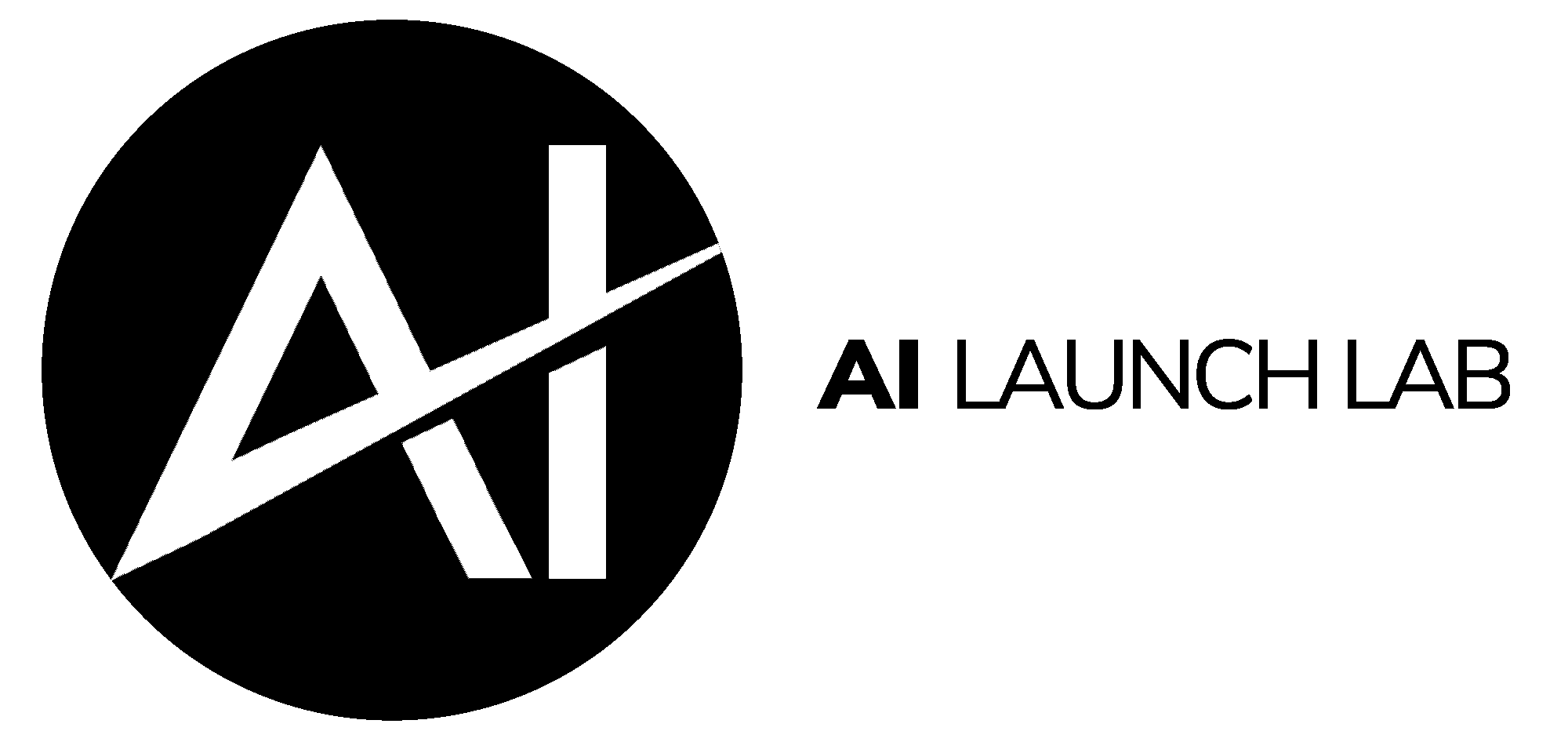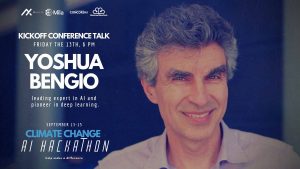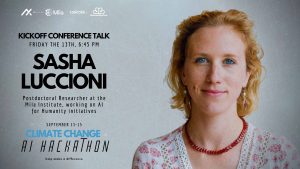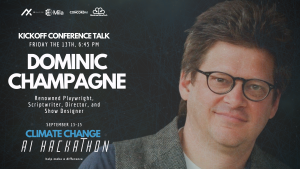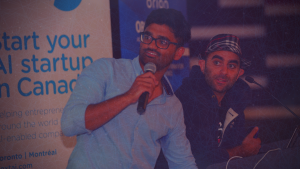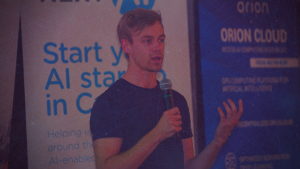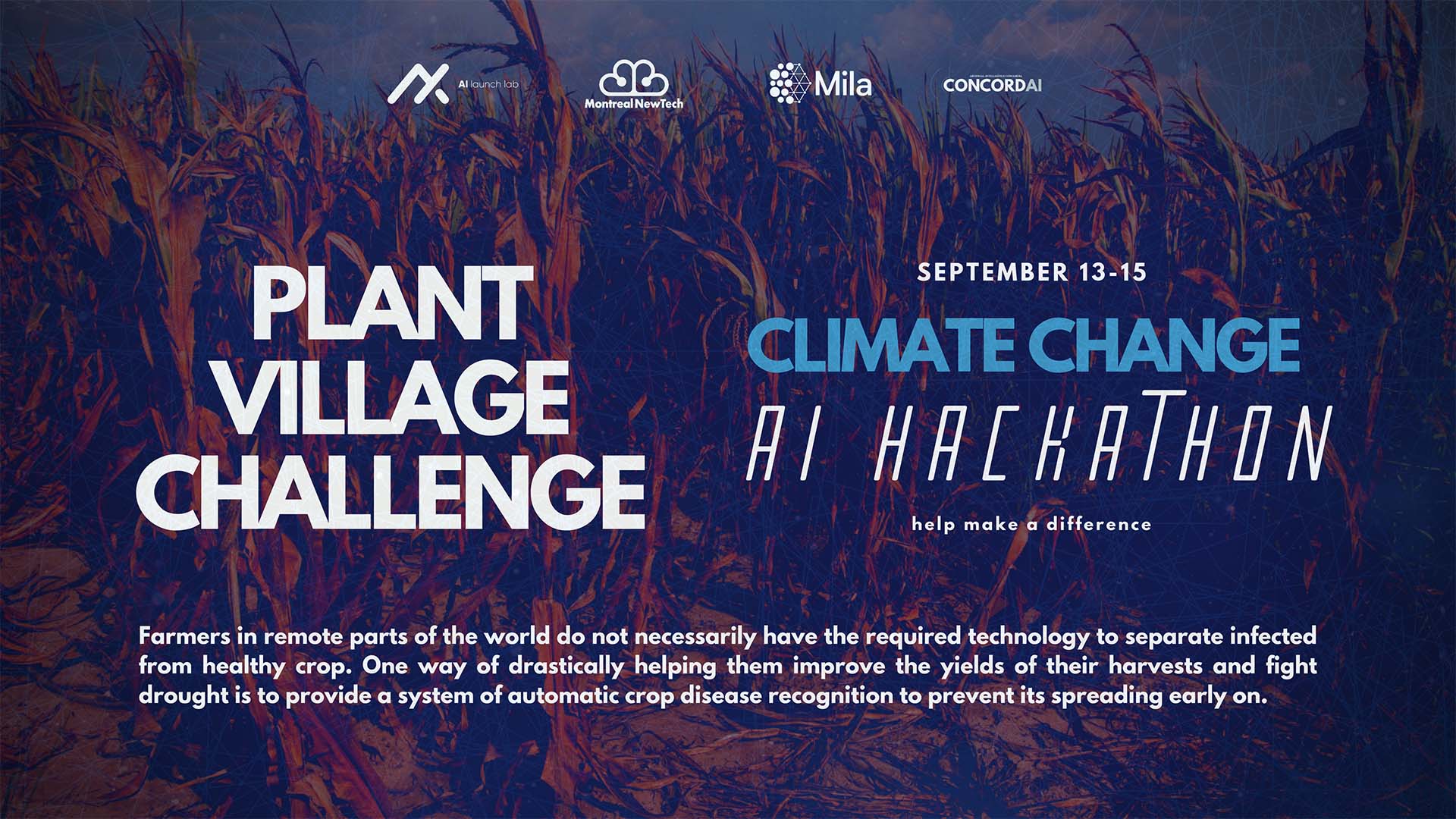Climate Change AI Hackathon 2019 was a huge success.
Thank you to all of our participants, partners, sponsors, and attendees!
Thank you to our reknowned keynote speakers!
Yoshua Bengio, leading expert in AI and
pioneer in deep learning
Sasha Luccioni, Postdoctoral Researcher at the Mila Institute, working on AI for Humanity initiatives
Dominic Champagne, renowned playwright, scriptwriter, director, and show designer
Congratulations to the Winners!
All participants are winners,
but these teams set themselves apart:
Climate Canada Open Data Challenge
Canada’s Changing Climate Report confirms that Canada’s climate will warm further due to additional global GHG emissions, with warming projected in all seasons. Other changes in climate are also projected to intensify with additional warming, such as increases in extreme heat, increases in total and extreme precipitation and declines in snow and ice cover. Hence, it is increasingly important for Canadians to incorporate climate change considerations in their decision-making processes.
Policlime
We trained a neural network to predict Canadian federal election results in Quebec based on weather station-derived climate variables.

Juliette Lavoie
Juliette is a master student in Atmospheric and Oceanic Sciences at McGill University. She studies sea ice and climate change in the Arctic. She completed her bachelor’s degree in Honours Physics where she had experience using machine learning as a tool in scientific research.
Juliette on LinkedInZiggy Pleunis
Ziggy is a PhD student in Physics at McGill University. He works on fast radio burst detection and characterization with the CHIME telescope. Before coming to Montreal, he obtained a master’s degree in Astronomy & Astrophysics from the University of Amsterdam.
More about ZiggyLisa Dang
Thomas Rademaker
I am Thomas Rademaker, PhD student in Physics at McGill University. During my M.Sc. at the University of Geneva I was well on my way to becoming a particle physicist, but I realized in time that life’s better when studying it. I thus pursued biophysics. In my current research, I look for physical mechanisms in immune activation using a variety of computational techniques (machine learning tailored to dimensional reduction).
Thomas on LinkedIn
Plant Village Challenge
Farmers in remote parts of the world do not necessarily have the required technology to separate infected from healthy crop. One way of drastically helping them improve the yields of their harvests and fight drought is to provide a system of automatic crop disease recognition to prevent its spreading early on.
Bombay Rockers
Real-time Plant Disease Classification and Trajectory Tracking
We chose to build a plant disease identification model and deployed it on an android app. We thought about how the app could be useful to farmers and realised that it would make sense to add the ability to be able to record the predictions made by the app and serve it to a monitoring application. This would enable to them to keep track of how the disease progresses over days. The dashboard shows the location of where the disease images were taken (GPS coordinates and the corresponding predictions along with the timestamps).
We think the spatial localization is much more important than just using an app and getting predictions from a model. Farm land usually spans a large area with multiple crops and hence keeping track of where the disease plants were observed can be quite useful. We faced many technical challenges but were able to hack quick and simple solutions to demonstrate that the concept could work in the real
world.
USPs
• Deployed on mobile app running classification at 25 frames per second on Android Snapdragon GPU
• GPS, timestamp and image tagging for triggered classes on a live web-app
• Creates 3D volumetric sparse map and tracks camera position in real-time – for more accurate diseased plant localization than GPS.
• This also works in environments where there’s no GPS signal

Amrit Krishnan
Amrit is a Computer Vision Research Engineer currently working at Algolux Inc., helping build a robust computer vision stack for Autonomous Vehicles. He has a background in Engineering Physics, and previous experience working at Zenuity AB, and Autoliv AB in Sweden, also as a Research Engineer, specialising in Computer Vision and Robotics.
Amrit on LinkedIn
Ronald Timbol
Ronald is a full stack developer specializing in data visualization. Currently employed at Algolux Inc., an autonomous vehicle startup, he has a previous background in the broadcast media industry.
Ronald on LinkedIn
Jean-François Taillon
Jim Aldon D’Souza
Jim is a perception research engineer at Algolux. He works at the intersection of mobile robotics and machine learning, and specializes in autonomous driving perception. His primary interests lie in robust perception, localization, and mapping for self-driving vehicles.
Prior to Algolux, he helped build HD maps for autonomous driving at TomTom in Amsterdam. He has a master’s in electrical engineering from the Technical University of Denmark and concluded his master’s thesis at the German Research Center for Artificial Intelligence in Bremen, Germany. His thesis addresses the localization issues faced by an autonomous planetary rover when navigating in a featureless environment such as the one on the surface of Mars or the Moon.
Building Inventory Challenge
Within Natural Resources Canada, a National Building Layer is needed for ER2 (Évaluateur rapide des risques), a web application for conducting climate-related risk assessments (floods and wildfires), and for the Canadian Energy End-use Mapping (CEE Map) project, which aims to monitor and optimize building energy performance and efficiency. Your innovation in this area will greatly advance these and other climate change mitigation and adaptation initiatives.
ICool
The goal of our project was to build a pipeline to populate some of the missing information in the national resource Inventory database. Our pipeline consists of 2 main parts: the facade parsing system and the building height detection System.
We conducted a review of existing facade parsing systems. We used CMP facade database and “DualGAN: Unsupervised Dual Learning for Image-to-Image Translation” algorithm to train a model. At the end, we performed some classical vision algorithms on the output of the model to retrieve the number of floors and windows.
For height detection, we collected and annotated google street view images. The main idea was to extract the height of the building through the 3D projection of cuboids on 2D images of the street view of buildings. We use an ensemble of randomized regression trees to detect 8 corners of a building.
Shima Nikfal
After completing a bachelor of science degree in computer science at Azad University in Tehran, I moved to Malaysia to pursue further education in the field. I decided to concentrate in the area of software testing, as I found the subject interesting during my studies at Azad. I graduated with a masters degree with that concentration and began my professional career. After working in the software testing field I began to feel drawn more towards programming and decided to return to university to pursue education in the field of image processing and pattern recognition. Given its reputation in the field, and my desire to experience a different culture I decided to attend Concordia University where I obtained a second master degree. I have since been working in the field, applying image processing techniques to solve real-world problems for several companies in the Montreal area. Lately, machine learning has been applied to many image processing projects, including the one I am currently working on. I quickly became fascinated with this new paradigm, and have been researching and applying it independently as well as part of my professional work. This fascination led me to create several projects of my own and to participate in local hackathons including the recent Climate Change project which my team won. I hope to continue pursuing machine learning and to find a position more focused on the subject than my current work.
Shima on LinkedInLadan Golshanara
After graduating with a Ph.D. and M.Sc. degree from the Department of Computer Science and Engineering at SUNY at Buffalo I moved to the beautiful city of Montreal. Being in a city that is a global hub for artificial intelligence, I decided to spend some time on practical applications of machine learning and deep learning. I participated in local tech events including two hackathons in which I was a winner, meeting amazing people including my teammate Shima along the way. Currently, Shima and I are working on a deep learning project to independently develop our skills in both computer vision and NLP.
More on LadanParas Kapoor
Paras on LinkedInPaul Cuciureanu
Climate Canada Open Data Challenge
Canada’s Changing Climate Report confirms that Canada’s climate will warm further due to additional global GHG emissions, with warming projected in all seasons. Other changes in climate are also projected to intensify with additional warming, such as increases in extreme heat, increases in total and extreme precipitation and declines in snow and ice cover. Hence, it is increasingly important for Canadians to incorporate climate change considerations in their decision-making processes.
Sunday

Challenge Approach Synopsis
Due to the shortsightedness of human nature the population is unable to grasp how the long-term trend Climate Change will affect their everyday lives. Without this understanding people are not motivated to make changes in how they behave. With this in mind we sought to project how climate change would affect road safety in the greater Montreal area. This approach illustrates how climate change can affect something they deal with on a daily basis: their commutes. With the climate provided data from ClimateData.ca, and the road accident datasets from the Montreal Open Data Portal, there is a wealth of information allowing us to forecast/project future road conditions.
Data contained historical and future climate projections from multiple weather models. This was a regression type problem where machine-learning models were used to predict number of accidents in certain areas on the island of Montreal. Models used consisted of linear regression (Baseline), Random Forests, Gradient Boosted forests and Dense Neural Networks. Dense neural networks proved to give the smallest Mean Average Error and predicted a rise of 13% of vehicular accidents on Bigras-Island.
Oliver Foster
Oliver has been working in the field on AI/Data Science for three and a half years. His introduction to the world of data science was working at an engineering firm where he was required to build a deep neural network classifier to classify faulty batteries in a manufacturer’s assembly line. Since then he has contributed to projects ranging from the creation of more efficient thermal simulators using machine learning to detecting financial fraud in a bank setting. Through the projects he has worked on he has become very efficient at wrangling & cleaning data using Pandas and Numpy along with effectively engineering machine learning solutions using Scikit-Learn, Tensorflow, and StatsModels.
Oliver on LinkedInMichael Pucci
Michael is a Chemical Engineering Graduate from McGill University in the process of completing a professional certificate in Machine Learning at McGill University Continuing education program. He has a passion for statistical analysis and developing machine learning models to tackle tough problems involving data. His current role is a solutions engineer for a database infrastructure company; however, he is in the pursuit of working as a data scientist and is a goal he is proactively striving to achieve. He has also finished 1st place at the transportation issues hackathon hosted by ConcordAI
Michael on LinkedInSpecial Mentions
These teams did a phenomenal job
NormallySane
Darrell Aucoin
Simon Dufort-Labbé
Yann Uzel
PlantSavers
Raghav Gupta
Himanshu Arora
Akshay Singh Rana
Ankur Agarwal
BBAI
Melisande Teng
Alice Breton
Adel Nabli
YOCCO
Khaled Matloub
Salma Elmahallawy
Reza Filsoof
Kenechukwu Nnodu
Julia Kreutzer
Climate Change AI Hackathon’s
amazing sponsors and partners






Thank you to our honourable and distinguished Judges!

Top row from left:
Stuart Spence – Scientific Programmer at Environment and Climate Change Canada
Claude Demers-Belanger, Technology Architect, Maxen Technology
Sydney Swaine-Simon – AI Fellow, Cofounder, District 3 Innovation Center
Bottom row from left:
Naysan Saran – Founder, Cann Forecast
Katherine Heighington – TD Data Science
Elisabeth Laett, Exagens
Ahmed Ragab – CanmetENERGY-Natural Resources Canada (NRCan)
Not in photo:
Nicholas Gibb, NRCan
Parnaz Tabrizian – Senior Consultant – Ivado Labs
CHALLENGES
.

